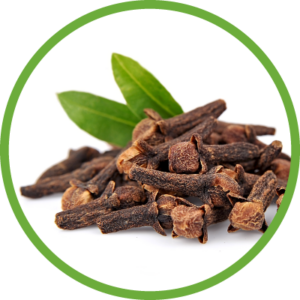5 Herbs for a Natural Digestive Detox

Do you suffer from an upset stomach, fatigue, bloating, and gas? Does it seem like no matter which foods you cut out of your diet, your gut just feels… unhappy? If so, you’re not alone. About 60-70 million people in the United States suffer from stomach problems according to the American Gastroenterological Association.
Our gut does so much more than process food. Over 70% of the immune system is found in the gut, and our gut microbiome produces vitamins, including B vitamins and vitamin K. Our gut is also where most of our neurotransmitters are made (such as serotonin), influencing our mood.
Additionally, research shows that the gut contains 100 million neurons and acts as a “second brain.” This means the health of the gut has profound effects on mental well-being. It’s important to focus on digestive health because it helps the body absorb nutrients, supports energy levels, and keeps us feeling our best.
Sometimes it’s tough to pinpoint the source of stomach issues. If you’re struggling with a chronic upset stomach, a detox may help. By clearing out toxins and unwanted microorganisms, your body can support a balanced, happy gut. One natural way to detox is by using herbs. Herbs have been used for centuries to aid digestion and promote cleansing.
Explore five amazing herbs that can boost your digestion and help your body detox naturally.
What is a Digestive Detox?
Detoxing is a way of ridding the body of toxins that build up over time. These toxins come from unhealthy foods, pollution, stress, or even microorganisms picked up from undercooked food. When toxins accumulate, your digestive system may be affected. Detoxing gives your gut a chance to “reset” by flushing out waste and improving its function. This can leave you feeling lighter, more energized, and healthier.
5 Herbs for a Natural Gut Detox
Herbal medicine has been around for thousands of years. Today, science is putting age-old methods to the test to understand how many of these herbs work in the body. When it comes to digestive health, these five herbs stand out among the rest:
1. Wormwood Leaf

An herb that grows in mild temperatures all over the world, wormwood has a sage-like aroma and bitter taste. An ancient remedy for stomach upset, wormwood is now being researched for its medicinal properties. Both wormwood and sweet wormwood contain powerful gut-benefiting compounds. The active compound in sweet wormwood is artemisinin, which research shows has potential to kill off harmful bacteria (1).
Recent studies found that extracts of the wormwood plant decreased the severity of stomach sores in animals. Human studies show that wormwood extracts can increase digestive secretions in the gut, supporting digestion, nutrient absorption, and helping to protect against unwanted organisms (2).
Researchers also wanted to explore wormwood’s ability to target intestinal parasites like tapeworms. They found the herb caused significant damage to the worms, leading to their death. In the gut, wormwood broke down the worms’ outer layer, disrupting their ability to absorb nutrients. Once the worms could no longer thrive, they died off (3).
2. Ginger Root

The root vegetable ginger is a seasoning staple in most kitchens. It packs a punch of flavor while also delivering a slew of benefits for digestive health.
In a study on ginger’s anti-inflammatory effects, researchers found that ginger helped produce butyrate. Butyrate is produced by gut bacteria and helps digestion, metabolism, and immunity (4). The study highlighted that ginger may be a staple herb to support gut health.
Participants in the study consumed ginger juice with results showing substantial benefits on the gut microbiome. Researchers noted more diverse intestinal flora and restored gut bacteria balance in subjects. When the gut microbiome is balanced, we can have less digestive discomfort while supporting the immune system.
3. Barberry Root

Barberry root is derived from a common plant grown across North America. Barberry contains the active compound berberine, which has a variety of applications for humans. Berberine fosters a healthy gut in many ways. For example, it helps to balance bacteria, supports digestion, and aids in the restoration of the gut’s protective barrier.
A review of research showed that berberine improved diarrhea in children and adults. It also shortened the length of time people suffered. This may be evidence that berberine has anti-inflammatory properties in the gut (5).
In another study, scientists found that berberine helped individuals with chronic stomach issues and diarrhea. Since berberine can help to stop the growth of bad bacteria, the lining of the intestines can recover. This shows that berberine exhibited overall healing properties in the gut (6).
4. Clove Bud

A familiar spice added to pumpkin pie, clove is a powerful herb with many uses. Research on clove bud shows that it may have the capacity to help the gut recover, fight against unwanted microorganisms, and help to prevent stomach discomfort.
Studies show that clove oil works well at fighting antibiotic resistant H. pylori, a bacterium that can cause peptic ulcers and gastritis (7). Research on intestinal parasites and cloves showed equally promising results. When a common intestinal parasite found in sheep was put in a strong clove solution, all the worms died within two minutes (8).
Scientists then tested clove to see if it could kill Trichinella spiralis, parasitic worms that infect humans. They found that clove was effective at killing both adult worms and larvae in lab tests (9).
5. Black Walnut Hull

Black walnut hulls contain juglone, along with natural plant compounds called polyphenols. The active compound juglone is found in its highest concentrations in black walnut’s hull, or the outer covering of the nut itself. This compound has many benefits for humans, especially as it relates to its ability to help reduce many types of unwanted microorganisms (10).
Research on black walnut hulls examined polyphenols, specifically tannins. The tannins in black walnuts have antibacterial and astringent properties. These compounds can fight harmful bacteria, helping to strengthen the gut (11).
The Takeaway
Using natural remedies, like herbs, is a gentle and effective way to support your body’s detox process. Herbs have been used for centuries in many cultures to soothe the digestive system and help remove toxins and unwanted microorganisms. The best way to achieve an herbal cleanse is with a specialized formula that includes herbs known for detox.
Herbs can aid digestion, support nutrient absorption, and promote regular bowel movements. Plus, they’re a safe alternative to harsh cleanses, making them a great choice for people looking to improve their digestive health naturally.

